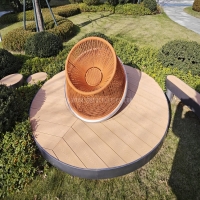Welcome to the website for landscape facilities products and knowledge.
How does the thickness of the plastic or metal impact the longevity of a landscape round trash can?
The durability of a round landscape trash can is heavily influenced by the thickness of its material, whether plastic or metal. Thicker materials generally offer greater resistance to wear, weather, and physical impacts, extending the can's lifespan.
For plastic trash cans, thicker walls (measured in millimeters or gauge) prevent cracking, fading, and deformation caused by UV exposure or extreme temperatures. High-density polyethylene (HDPE) with a thickness of 3mm or more is ideal for long-term outdoor use. Thinner plastics may become brittle over time, especially in harsh climates.
Metal trash cans, typically made of galvanized steel or aluminum, rely on gauge thickness for durability. A lower gauge number (e.g., 12-16 gauge) indicates thicker, more robust metal that resists dents, rust, and animal damage. Powder-coated finishes on thicker metal further enhance longevity.
In high-traffic areas or commercial settings, opting for thicker materials—regardless of type—ensures better longevity. Thinner cans may be cost-effective but often require frequent replacement, offsetting initial savings. Proper maintenance, like cleaning and avoiding overloading, also plays a role in maximizing lifespan.
Ultimately, the right thickness balances budget and durability needs, with thicker materials proving wiser for long-term landscape waste management.
Related search:

Recommendation
Swivel chair-Specialty steel structure woven rattan leisure chair with rotatable design